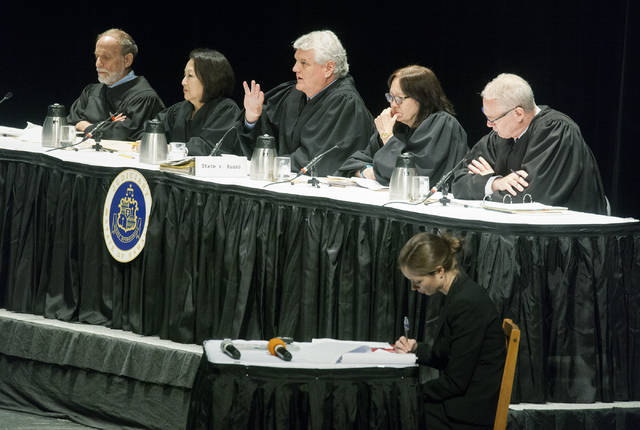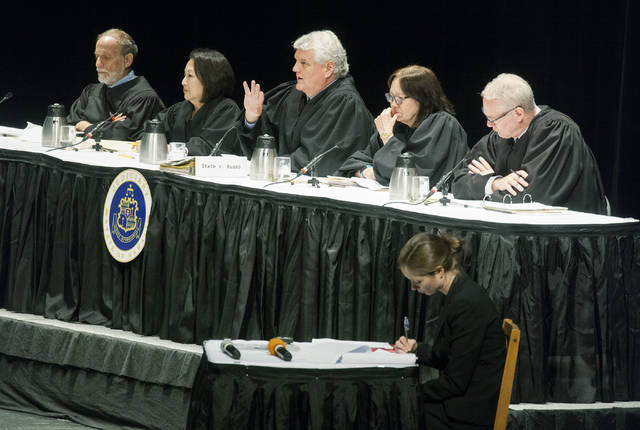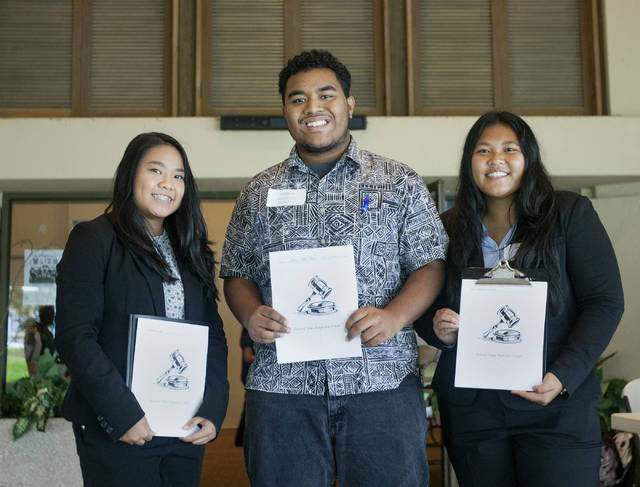Big Island students see high court in action
The Hawaii Supreme Court was in session Thursday at the University of Hawaii at Hilo Performing Arts Center, witnessed by students from UH-Hilo and several local high schools.
ADVERTISING
The state’s high court heard oral arguments in the criminal case Hawaii v. Russo. The proceeding was part of the state Judiciary’s Courts in the Community outreach program, which aims to educate students and the public about the judiciary’s role in government and its function in resolving disputes in a democratic society.
“I thought this was amazing. Not a lot of important things happen down here in Hilo, so to see the Hawaii Supreme Court come here was quite an amazing experience,” said John Narruhn, one of three Waiakea High School students handpicked by the Judiciary to talk to the media after the proceedings.
Other schools with students on hand included Hilo High School, Connections Public Charter School, Laupahoehoe Community Public Charter School, Honokaa High School and Hawaii Academy of Arts and Sciences. In sessions closed to the public and media, students had the opportunity to interact with and ask questions of the justices and attorneys.
The case was an appeal from the District Court of the Second Circuit on Maui, which dismissed a Nov. 20, 2012, petty misdemeanor charge of failure to comply with a lawful order of a police officer directing traffic against Thomas “Tommy” Russo, publisher of Maui Time, an alternative weekly newspaper. Russo recorded cellphone video of officers checking motorists along Haleakala Highway for reconstruction permit violations, such as tires too wide, vehicles too high or low, and excessive windshield tinting. An officer alleged that Russo defied an order to move to a safer distance.
The lower court dismissed the charge on the ground there wasn’t probable cause to support it. Since the dismissal was with prejudice, prosecutors couldn’t reinstate the charge, so they chose to appeal the dismissal. The state’s Intermediate Court of Appeals ruled 2-1 the lower court erred and there was probable cause for the charge. Russo then appealed to the Supreme Court.
Russo’s attorney, Jacob Lowenthal, and Maui Deputy Prosecutor Richard Minatoya argued for about a half-hour each before the high court. The justices interrupted both lawyers on numerous occasions with rapid-fire questions about facts of the case, actions by Russo and officers, and their interpretations of applicable law.
After arguments, Chief Justice Mark Recktenwald announced the high court would take the case under advisement and issue its ruling at a later date.
Iolani Mangoba, a Waiakea student who aspires to become an FBI agent, called the proceedings “a great experience.”
“We had lawyers come in telling us what would happen and it was exactly like what they said,” she noted. “They said the justices will interrupt them if they have a comment or question. And that’s what they did.”
Waiakea student Pamela Oda, who also hopes to be an FBI agent, praised the lawyers’ preparation.
“Any question that was thrown at them, they were able to answer it and in a thorough way,” she said.
Narruhn, who wants to become an attorney, said he was “really impressed” with Minatoya and Lowenthal.
“They really knew what they were talking about. Everything I thought about the case was exactly how it played out,” he said.
There was a visible presence by police and state sheriff’s deputies for security. Also present was a sizable number of lawyers, who took in the proceedings in the relative comfort of the theater’s padded seats, as opposed to the hardwood benches of courtroom galleries.
County Prosecutor Mitch Roth said it was “great” for students “to interact and see both sides of the case.”
“I think, in this case, it will be interesting to see how the Supreme Court decides, on one side, constitutional rights issues, and on the other side, you have the issue of safety,” he said.
Retired Hilo Circuit Judge Glenn Hara said that the setting is different but the students saw what happens at Aliiolani Hale in Honolulu, the high court’s home.
“I think some of the issues that were discussed here are very pertinent,” he said. “… One aspect that was not brought up is that (Russo) was saying, ‘Hey, I’m (the publisher) of a newspaper.’ Do you treat members of the press differently for First Amendment purposes in these kinds of situations?”
Recktenwald said he chose the case because it “just jumped out as something that young people would be able to engage in.”
“To me, the most important thing is showing our young people what the rule of law looks like in action,” he said. “I could talk about it until I’m blue in the face about, ‘This is a court; this is what courts do.’ But when you actually see it in person, I think it becomes incredibly more relevant. They understand, I hope, that it’s a process that has integrity, that has fairness, that’s designed to get to the truth — that we ask tough questions of both sides to get to the heart of the matter and apply the law fairly to each case.”
Email John Burnett at jburnett@hawaiitribune-herald.com.

Featured Jobs
Featured JobsBig Island students see high court in action


The Hawaii Supreme Court was in session Thursday at the University of Hawaii at Hilo Performing Arts Center, witnessed by students from UH-Hilo and several local high schools.
The Hawaii Supreme Court was in session Thursday at the University of Hawaii at Hilo Performing Arts Center, witnessed by students from UH-Hilo and several local high schools.
The state’s high court heard oral arguments in the criminal case Hawaii v. Russo. The proceeding was part of the state Judiciary’s Courts in the Community outreach program, which aims to educate students and the public about the judiciary’s role in government and its function in resolving disputes in a democratic society.
ADVERTISING
“I thought this was amazing. Not a lot of important things happen down here in Hilo, so to see the Hawaii Supreme Court come here was quite an amazing experience,” said John Narruhn, one of three Waiakea High School students handpicked by the Judiciary to talk to the media after the proceedings.
Other schools with students on hand included Hilo High School, Connections Public Charter School, Laupahoehoe Community Public Charter School, Honokaa High School and Hawaii Academy of Arts and Sciences. In sessions closed to the public and media, students had the opportunity to interact with and ask questions of the justices and attorneys.
The case was an appeal from the District Court of the Second Circuit on Maui, which dismissed a Nov. 20, 2012, petty misdemeanor charge of failure to comply with a lawful order of a police officer directing traffic against Thomas “Tommy” Russo, publisher of Maui Time, an alternative weekly newspaper. Russo recorded cellphone video of officers checking motorists along Haleakala Highway for reconstruction permit violations, such as tires too wide, vehicles too high or low, and excessive windshield tinting. An officer alleged that Russo defied an order to move to a safer distance.
The lower court dismissed the charge on the ground there wasn’t probable cause to support it. Since the dismissal was with prejudice, prosecutors couldn’t reinstate the charge, so they chose to appeal the dismissal. The state’s Intermediate Court of Appeals ruled 2-1 the lower court erred and there was probable cause for the charge. Russo then appealed to the Supreme Court.
Russo’s attorney, Jacob Lowenthal, and Maui Deputy Prosecutor Richard Minatoya argued for about a half-hour each before the high court. The justices interrupted both lawyers on numerous occasions with rapid-fire questions about facts of the case, actions by Russo and officers, and their interpretations of applicable law.
After arguments, Chief Justice Mark Recktenwald announced the high court would take the case under advisement and issue its ruling at a later date.
Iolani Mangoba, a Waiakea student who aspires to become an FBI agent, called the proceedings “a great experience.”
“We had lawyers come in telling us what would happen and it was exactly like what they said,” she noted. “They said the justices will interrupt them if they have a comment or question. And that’s what they did.”
Waiakea student Pamela Oda, who also hopes to be an FBI agent, praised the lawyers’ preparation.
“Any question that was thrown at them, they were able to answer it and in a thorough way,” she said.
Narruhn, who wants to become an attorney, said he was “really impressed” with Minatoya and Lowenthal.
“They really knew what they were talking about. Everything I thought about the case was exactly how it played out,” he said.
There was a visible presence by police and state sheriff’s deputies for security. Also present was a sizable number of lawyers, who took in the proceedings in the relative comfort of the theater’s padded seats, as opposed to the hardwood benches of courtroom galleries.
County Prosecutor Mitch Roth said it was “great” for students “to interact and see both sides of the case.”
“I think, in this case, it will be interesting to see how the Supreme Court decides, on one side, constitutional rights issues, and on the other side, you have the issue of safety,” he said.
Retired Hilo Circuit Judge Glenn Hara said that the setting is different but the students saw what happens at Aliiolani Hale in Honolulu, the high court’s home.
“I think some of the issues that were discussed here are very pertinent,” he said. “… One aspect that was not brought up is that (Russo) was saying, ‘Hey, I’m (the publisher) of a newspaper.’ Do you treat members of the press differently for First Amendment purposes in these kinds of situations?”
Recktenwald said he chose the case because it “just jumped out as something that young people would be able to engage in.”
“To me, the most important thing is showing our young people what the rule of law looks like in action,” he said. “I could talk about it until I’m blue in the face about, ‘This is a court; this is what courts do.’ But when you actually see it in person, I think it becomes incredibly more relevant. They understand, I hope, that it’s a process that has integrity, that has fairness, that’s designed to get to the truth — that we ask tough questions of both sides to get to the heart of the matter and apply the law fairly to each case.”
Email John Burnett at jburnett@hawaiitribune-herald.com.





